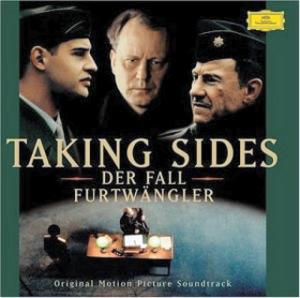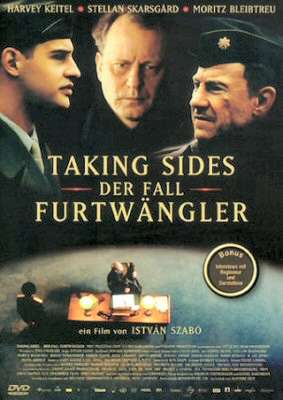Film, Soundtrack and DVD Review
Taking Sides (2001)
Directed by Istvan Szabo
Music by Beethoven, Schubert, Bruckner
conducted by Wilhelm Furtwängler and Daniel Barenboim
DVD available on VCL, region 2; OST available on DG471 564-2
Running time: 105 minutes
DVD from www.amazon.de OST from Amazon UK

Szabo's film took a considerable time to come out in both the UK and the US (in fact, a DVD version has been available in Germany since early 2002). Based on Ronald Harwood's stage play of the same name, Taking Sides is certainly not standard fare, despite the fact its cast includes Harvey Keitel in a typically unsubtle performance. But the subject – the denazification tribunal Wilhelm Furtwängler faced after the Second World War – makes for riveting drama, especially given that Szabo sets up some interesting moral comparisons. Indeed, Stellan Skarsgard as the German conductor gives an astonishing performance aided by the considerable latitude Szabo gives him to draw distinctive parallels between the 'artist' and the 'accuser'. One could argue that casting Keitel as the interrogating Major Steve Arnold is an equally effective move, since Keitel seems to rather relish his role as an interrogator who has no understanding of art at all, and certainly no appreciation of music. Both Szabo and Harwood drive home the differences between these two men so heavily that at times the film's crucial theme – the role of the artist within a totalitarian society – seems lost.
But it is the music that takes centre stage, and any original soundtrack composer (none is actually credited) would find it extremely difficult to match what we hear in Taking Sides. With Beethoven's Fifth Symphony and Bruckner's Seventh taking up the symphonic chunks (and the adagio from Schubert's String Quintet D956 a sizeable chunk elsewhere) Szabo is keen to portray music as High Art. The Schubert (one of that composer's profoundest creations) takes place in a bombed out church amidst all the chaos of post-war German destruction (the film was made in Berlin and Dresden, both left desolate at the War's close) and sections of the first and second movements of Beethoven's Fifth appear in actual performances that Furtwängler conducted in 1943. The excerpt from the adagio of Bruckner's Seventh – in a 1949 Berlin performance – is used only to exploit the view of how the Nazis used music for political ends (this was the very music that was broadcast by the Nazis immediately after Hitler's death). Furtwängler is confronted with this fact when Arnold attempts to prove how complicit Furtwängler was in the Nazi propaganda machine.
The performance of Beethoven's Fifth is the only surviving one we have of Furtwängler conducting the work during the Second World War, and its scale is extraordinary: mighty fortissimos, granite-like chords and explosive brass. The andante played in the film is both more measured and more taut than usual; in other words, this is a performance of considerable personal rawness, something common to much of Furtwängler's wartime legacy. Quite why, therefore, the film-makers should have Daniel Barenboim and his Berlin Staatskapelle "recreate" the first movement – nuance by nuance – is unfathomable. If it shows only one thing it is that great art is simply unique, and great conductors are singular artists.

In a film that is a set series of contrasts – between personalities and cultures, innocence and guilt – it seems equally appropriate that most of the Americans are seen celebrating the War's end amidst the officers' clubs and to music by Glenn Miller, Bobby Troup and George and Ira Gershwin (the exception being the two interrogating officers who are aiding Major Arnold, and who prefer Schubert).
Szabo's film may fictionalise events but it succeeds on two levels. It works as compelling drama and it succeeds in making all artists who work under the constraints of totalitarianism as contemporary an issue today as the events portrayed in this film were 60 years ago. Furtwängler's reputation still remains tarnished by what happened after the War, and Taking Sides is clear proof that the matter is not yet resolved.
Marc Bridle
Film rating:
31/2
DVD rating:21/2
Return to Index